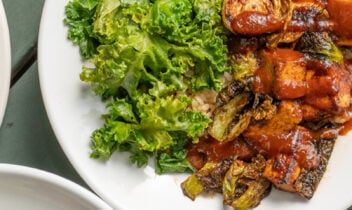TheBUZZ: Phytochemicals are too complex and confusing?
WHAT THEY’RE SAYING
With all of the different phytochemicals, polyphenols, and antioxidants in the press, it’s hard to know which ones are beneficial for your health.
WHAT WE KNOW
Phytochemicals … phytonutrients … polyphenols … antioxidants … what do all of these terms mean?
The term phytochemicals is the broad name for a wide variety of compounds produced by plants. They are found in fruits, vegetables, beans, grains, and other plants. Known phytochemicals have a broad range of protective benefits such as reducing inflammation, speeding healing, preventing infection, protecting your arteries, and curbing cancer.
Think of them like this … phytochemicals are plants’ self-protection program, meaning they help shield young buds and sprouts from pollution, insects and the elements. When we eat fruits and vegetables containing phytochemicals, they pass along many of these protective benefits to us.
While many phytochemicals function as antioxidants, not every phytochemical has antioxidant qualities. Each phytochemical comes from a variety of different plant sources, and has different proposed effects and benefits for the body. Some functions have yet to be discovered by science to this day!
Common Names for Phytochemicals: antioxidants, flavonoids, phytonutrients, flavones, isoflavones, catechins, anthocyanidins, isothiocyanates, carotenoids, allyl sulfides, polyphenols
HOW DO WE KNOW THIS?
Some researchers estimate up to 4,000 phytochemicals exist! Scientists have identified thousands of phytochemicals, although only a small fraction of them have been studied closely. Health Benefits of Phytochemicals
New experimental studies are emerging that demonstrate multiple effects of fruits and vegetables and their phytochemicals, suggesting that fruits and vegetables may have an even greater role to play in human health than the already positive results seen to date.
OUR ADVICE
Phytochemicals are found in plant foods (fruits, vegetables, beans, grains), and by following a balanced eating pattern that includes different forms and colors of fruits and vegetables, you’ll provide your body with a wide variety of all beneficial compounds—including phytochemicals!
Evidence shows that the antioxidant qualities provided by phytochemicals are best acquired through whole food consumption (e.g. fruits and vegetables). In fact, some vitamins, minerals, and phytochemicals, are more readily available for the body when consumed in the presence of other nutrients (i.e. when consuming a balanced meal), suggesting that supplementation as not as effective.
The bottom line: Fill half your plate with beautiful, tasty, nutrient-packed fruits and vegetables … with space on the plate for grains and protein, too. This will give your body all of its vitamins, minerals, and the added benefits of phytochemicals too!
Produce for Better Health Foundation Phytochemical Center
USDA Phytonutrient Info
|


